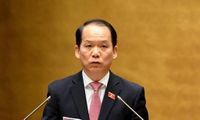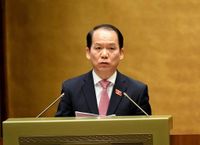On the afternoon of June 13, 2025, Vietnam's National Assembly continued its 9th session with a significant focus on constitutional reform, specifically discussing the draft Resolution to amend and supplement certain articles of the 2013 Constitution. This session marked a crucial step in Vietnam's ongoing efforts to refine its legal and administrative framework, reflecting extensive public participation and legislative deliberation.
Hoang Thanh Tung, Chairman of the Law and Justice Committee of the National Assembly and a member of the drafting committee, presented a comprehensive report detailing the process of collecting and addressing public feedback. Over the course of one month, a staggering 280,226,909 opinions were gathered from agencies, organizations, and individuals nationwide, reflecting an unprecedented level of civic engagement. According to the Government's Report No. 472/BC-CP, an overwhelming 99.75% of these respondents supported the necessity of amending and supplementing parts of the 2013 Constitution, as well as the scope and fundamental content of the draft Resolution.
The report underscored the government's commitment to transparency and inclusiveness by compiling, synthesizing, and objectively reflecting the diverse views of the Vietnamese people. Hoang Thanh Tung emphasized that the drafting committee had meticulously studied and incorporated the feedback, aligning the proposed amendments with the Party Central Committee's guidelines and other key political directives.
One of the prominent areas of discussion involved the roles and structures of political-social organizations, including the Vietnam Fatherland Front, the Vietnam General Confederation of Labor, and other affiliated bodies, as outlined in Articles 9, 10, and 84 of the Constitution. The committee agreed to maintain the affirmation that these organizations operate under the leadership of the Communist Party of Vietnam and are chaired by the Vietnam Fatherland Front. Notably, the wording in Clause 2, Article 9 was revised from "under the chairmanship of the Vietnam Fatherland Front" to "chaired by the Vietnam Fatherland Front," and the reference to the charters of these organizations was removed to streamline the constitutional language.
Further refinements were made to Article 10 to eliminate redundancy by removing the phrase "under the Vietnam Fatherland Front," ensuring the Constitution's conciseness. The article also explicitly states that the Vietnam General Confederation of Labor is the sole representative of laborers in national labor relations and international trade union affairs, underscoring its irreplaceable role.
The organization of administrative units and local government was another critical focus, particularly Articles 110, 111, 112, 114, and 115. The draft Resolution proposes a two-tier system of administrative units: provinces and centrally-run cities at the top level, with subordinate administrative units below them as defined by law. This structure aims to simplify governance, improve efficiency, and bring government functions closer to the people.
Importantly, the draft retains the existing requirement to consult local populations before establishing, dissolving, merging, dividing, or adjusting administrative boundaries, preserving democratic participation at the grassroots level.
Regarding special administrative-economic units, the committee highlighted their unique nature, distinct from regular administrative units. These units, first recognized in the 1992 Constitution and continued in the 2013 version, may vary widely in scale, governance, and policies to suit local priorities and development goals. To reflect this, the draft Resolution proposes a dedicated clause in Article 110 and suggests that the National Assembly determine the local government structures for these special units upon their establishment.
On the topic of local government organization, the committee recommended retaining the current constitutional provisions defining "local government" and "local government level" to allow for ongoing research and diversification of governance models suitable for rural, urban, and island settings. This approach acknowledges the practical challenges and varying needs across Vietnam's diverse regions.
A noteworthy aspect of the discussions was the right of People's Council representatives to interpellate, especially concerning high-ranking judicial officials such as the Chief Justice of the People's Court and the Chief Prosecutor of the People's Procuracy, as stipulated in Clause 2, Article 115. Many delegates and public opinions favored preserving this oversight mechanism, viewing it as vital for checks and balances within state power. Some even suggested expanding interpellation rights to include heads of other central agencies operating locally, like civil judgment enforcement, tax, and customs authorities.
Ultimately, the committee proposed retaining the existing constitutional provision on this matter, ensuring that Article 115 remains unchanged to safeguard the People's Councils' supervisory role.
During the session, the committee also addressed the practicalities of implementing the two-tier local government system. The model envisions local governments at each level comprising both People's Councils and People's Committees. However, recognizing the unique circumstances of some island administrative units—characterized by small populations and challenging transport conditions—there was openness to adapting governance structures, including pilot programs that have operated administrative bodies without People's Councils in certain urban areas.
Such flexibility aims to balance administrative efficiency with democratic representation, tailoring governance to local realities.
Another key procedural point was the effective date of the amended Constitution. The committee recommended that the Resolution take effect immediately upon its approval by the National Assembly, expected on June 16, 2025, with the President promulgating it on the same day. Additionally, to align with the administrative reorganization roadmap and facilitate smooth transitions, it was proposed that all district-level administrative units nationwide cease operations from July 1, 2025.
This timeline underscores the urgency and careful planning behind Vietnam's administrative reforms, aiming to streamline government structures and enhance public service delivery.
The National Assembly's session was broadcast live on radio and television, reflecting the government's commitment to transparency and public engagement in this landmark constitutional reform process.
Vietnam's constitutional amendments represent a significant evolution in governance, balancing respect for established political structures with pragmatic reforms to meet contemporary challenges. The extensive public consultation and thoughtful legislative debate highlight a robust participatory process, striving to ensure that the Constitution remains a living document responsive to the nation's needs.


